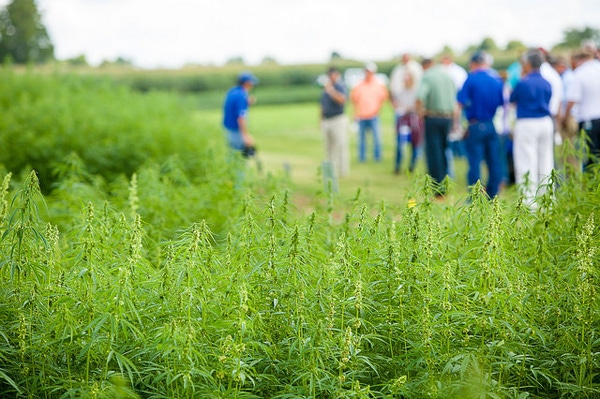September 3, 2015

Kentucky hemp research trials this year include hemp varieties for the production of fiber, grains and cannabinoids. Cannabinoids, such as hemp-based cannabidiol, can be used in food and dietary supplements for consumer health and wellness benefits.
“Our work has expanded greatly this year to include all three harvestable components of hemp,” said University of Kentucky agronomists David Williams, who along with Rich Mundell, leads the research. “We are hoping to optimize grower profitability through these small plot studies.”
Industrial hemp research at the University of Kentucky is moving along in its second year. Researchers in the University of Kentucky College of Agriculture, Food and Environment hosted a field day Aug. 13 to showcase their current hemp projects, conducted under the guidance of the Kentucky Department of Agriculture.
Research projects include comparing the fiber quality of three varieties of hemp. The varieties will be compared to each other as well as flax and kenaf, other fiber plants. The project will look at two harvest methods and three harvest timings when the plants are at different maturities.
Other research includes two separate hemp variety trials for fiber and grain production, herbicide tolerance trial for hemp used for grain production and a row spacing trial geared toward fiber production. Specific projects are conducted in conjunction with researchers at Murray State University, Western Kentucky University and Eastern Kentucky University.
Earlier this year, UK researchers faced some initial planting delays due to acquiring seed from international sources and wet weather throughout much of the spring and summer. These delays will not affect harvest, but will likely have researchers harvesting smaller plants.
Leah Black is the university’s first graduate student concentrated solely on hemp research in the modern era. Her research projects focus on cannabinoid production. In addition to being used in food and dietary supplements, the pharmaceutical industry is researching cannabinoids for a variety of therapeutic purposes. Right now, all of the cannabinoids found in health and nutrition products come from outside the U.S.
Black is specifically investigating whether unfertilized populations of female hemp plants produce more cannabinoids. She will also conduct a yield test based on direct seeding and various seed densities using a tobacco setter.
“It’s a very familiar process for our Kentucky tobacco farmers, which is who we are trying to center the experimental design on,” she said. “We still have a lot to learn, especially when it comes to harvest, but it’s definitely a point of interest for us to try to preserve the equipment that our farmers are used to.”
While UK research is still in its beginnings, UK agronomists hope this year provides the first of what will eventually become publishable research data. All agronomy research must be conducted for at least two years.
About the Author(s)
You May Also Like




